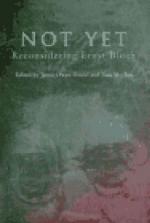|
This section contains 2,299 words (approx. 8 pages at 300 words per page) |

|
Ernst Bloch, the German Marxist philosopher, was born at Ludwigshafen. Influenced by late German expressionism and by the atmosphere of Munich after World War I, Bloch's style and thought reveal contradictory and uncertain trends. He began his career at the University of Leipzig by publishing Von Geist der Utopie in 1918. This work was followed in 1922 by a study of Thomas Münzer in which mystical and eschatological ideas blend with dialectic elements of Marxist-Hegelian origin. Spuren followed in 1930 and Erbschaft dieser Zeit in 1933. In the latter work the various elements of Bloch's thoughts are for the first time clearly placed within a Marxist framework showing revisionist tendencies.
In 1933 Bloch left Germany, eventually reaching the United States, where he created his major work, Das Prinzip Hoffnung, a huge work that has been called "a monstrous essence of his thoughts." After World War II Bloch, like...
|
This section contains 2,299 words (approx. 8 pages at 300 words per page) |

|


